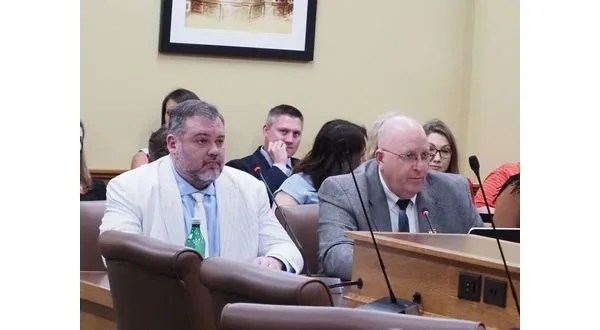
Rep. Matt Duffield, R-Russellville, and Sen. John Payton, R-Wilburn, present a proposed constitutional amendment to affirm Arkansans’ right to keep and bear arms to the House Committee on State Agencies and Governmental Affairs on Monday, April 14, 2025. (Tess Vrbin/Arkansas Advocate)
Three proposed constitutional amendments are expected to appear on Arkansas voters’ 2026 ballots after receiving legislative approval this week.
The House and Senate approved three Republican-led measures and sent them to Gov. Sarah Huckabee Sanders’ desk:
– A proposal to affirm that the right to keep and bear arms under the Second Amendment to the U.S. Constitution “is a natural, fundamental, and individual right that shall not be infringed.”
– A proposal to allow the Legislature to create economic development districts throughout the state
– The Citizens Only Voting Amendment, to affirm that only U.S. citizens can vote in Arkansas, which is already the law
All three proposals received approval from the House and Senate Committee on State Agencies and Governmental Affairs before each chamber voted on them.
The Legislature is allowed to refer a maximum of three amendments to voters during every regular session. Lawmakers referred only one measure to the 2024 ballot, a proposal for trade-school students to be eligible for scholarship lottery funds, which voters overwhelmingly approved in November.
The proposal pertaining to gun rights would alter the portion of the Arkansas Constitution that echoes the federal Second Amendment. The concise language of the amendment would clarify that the right to keep and bear arms extends to “the possession and use of” ammunition, firearm accessories and firearm components.
The proposed amendment did not generate discussion on the Senate floor last week or on the House floor Tuesday. House sponsor Rep. Matt Duffield, R-Russellville, gave an eight-minute speech encouraging his colleagues to support the measure.
“At the end of the day, the Second Amendment and our own right to keep and bear arms in the Arkansas Constitution is not about hunting, it’s not about sport-shooting and it’s not about self-protection,” Duffield said Tuesday. “It’s about a citizen’s last line of defense against tyranny, and it’s part of our nation’s DNA.”
Sen. John Payton, R-Wilburn, was the Senate sponsor of the amendments pertaining to firearms and noncitizen voting. Rep. David Ray, R-Maumelle, sponsored the Citizens Only Voting Amendment and told the House on April 7 that language in state constitutions that say “every citizen” or “any citizen” can vote is “a floor rather than a ceiling.”
“[Existing language] protects your right and my right as a citizen, but it’s insufficient because it leaves room for other people to be added to that list,” Ray said.
Noncitizen voting is already illegal in federal elections. Noncitizen voting in local elections is rare nationwide, but it has been legalized in a handful of cities, leading to backlash from conservatives.
House Bill 1422, another proposed measure to further ensure citizens do not vote in Arkansas, failed in the House in March. The bill needed 67 House votes because part of it would have amended the state Constitution, and 53 Republicans supported the bill while 14 more did not vote.
Rep. Diana Gonzales Worthen, D-Springdale, expressed opposition to both the bill that failed and the proposed amendment that passed. She told her colleagues both times that noncitizens do not attempt to vote because it would cost them their path to U.S. citizenship.
Thirteen states – including Louisiana, Oklahoma and Missouri – have amended their constitutions since 2020 to specify that noncitizens cannot vote in those states.
The amendments pertaining to noncitizen voting and gun rights passed the House and Senate mostly along party lines, while the economic development amendment had bipartisan support in both chambers.
This proposed amendment defines an economic development district as “a designated area within a city, county, or cooperative area established under authority granted by the General Assembly to promote economic development.” Sen. Jonathan Dismang, R-Searcy, introduced the measure in the Senate.
“What we’re trying to do is level the playing field with our neighboring states,” House sponsor Rep. Howard Beaty, R-Crossett, told his colleagues Wednesday. “…It’s going to allow direct local incentives to be made, potentially for retail, for housing, to clean up blight in your communities, and it’s going to have the ability for local control, where your local communities can decide what’s important to them.”
The proposed amendment generated 45 minutes of debate on the House floor. Rep. Robin Lundstrum, R-Elm Springs, said she disliked that the proposal says “loans and grants of public money” will support economic development projects.
“The taxpayer is who this will roll down the hill upon if it should fail,” Lundstrum said. “I think this particular idea needs more vetting and more time.”
Rep. Carol Dalby, R-Texarkana, expressed support for the measure.
“You come through Texarkana, you cross that state line and you see the economic development that happens in Texas,” Dalby said. “It’s not for lack of trying [in] Texarkana, Arkansas or Miller County, Arkansas. I guarantee you we fight constantly to get things into our district, and here’s what we hear all the time: ‘I can go across the state line and I can get a better deal.”
Proposed constitutional amendments require a simple majority of voter approval to go into effect. All three amendments would be effective Jan. 1, 2027 if approved.
To view this story, or for more news updates from Arkansas Advocate, click here.
WebReadyTM Powered by WireReady® NSI










